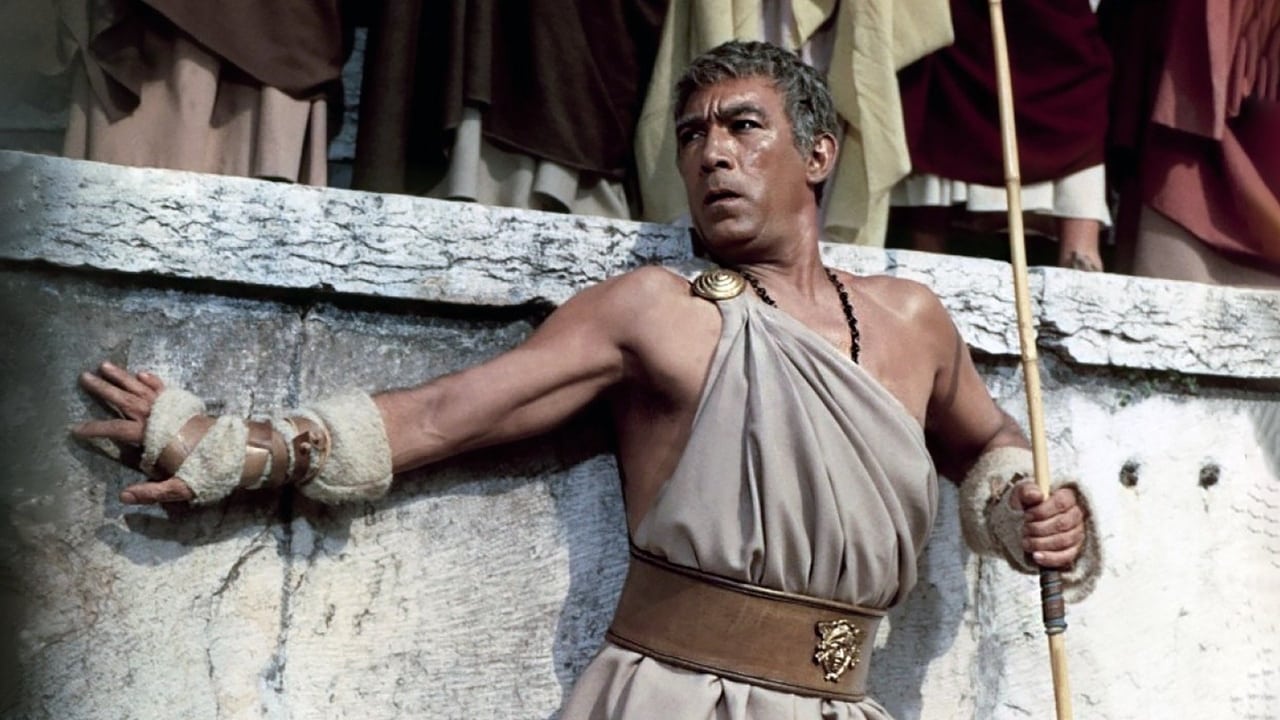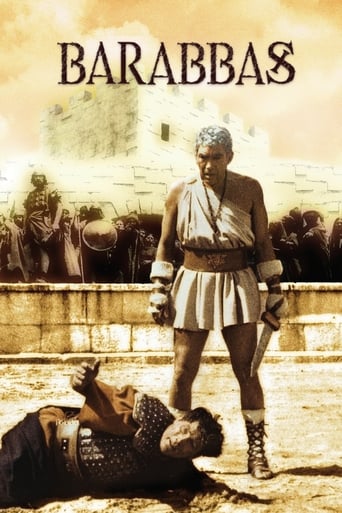

While at first you could possibly be forgiven for thinking Barabbas might look like a cheap Italian epic, it is far, far from being so. The person I saw it with described it as a sword a sandal epic with some religion thrown in to cash in on the genre. If you also thought so, then maybe you need to look again. This has to be one of the most literate screenplays given to a 'Biblical' (yet non-Biblical epic). Bristol born Sceenwriter Christopher Fry, regarded by many as the Shakespeare of the 20th Century, has crafted a perceptive adaptation of Swedish Nobel Prize winner Par Lagerkvists' novel of the same name. The film wreaks of stunning atmosphere. Striking images created by award nominated Cinematographer Aldo Tonti conjure up the best art of the dark age masters. Pay special attention to the Crucifiction scenes, these were filmed during an actual eclipse of the Sun, as it occurred on 15th Feb 1961! The production design by Mario Chiari was also award nominated, and deservedly so, leaving you gasping for air amid astoundingly realistic sets. The National Board of Review awarded Barabbas the Best Foreign Film of it's year.Mario Nascimbene caps the eerie moods with an innovative haunting music score. While the action scenes are violent in their recreation, they serve to force us to realize the shocking inhumanity of the Roman Arena, a severe denouncement of the repugnant, decay riddled Roman Empire. Anthony Quinn, Vitorio Gassman, Harry Andrews, Silvana Mangano, Ernest Borgnine, et-all, give convincing performances that should sweep the discerning viewer along a tour de force journey. Jack Palance is truly menacing in a larger than life performance as the arena's maniacal killer. While it's mostly impossible to fully translate a novel into a screen play, it seems Fry has worked hard to keep much of the poetic prose of Lagerkvists' 50's original intact.American Director Richard Fleischer (son of famous animator Max) demonstrates full command of this difficult project and infuses it with the same intensity he imparted to several of his other gripping works: Compulsion '59 ~ 10 Rillington Place '71 ~ The New Centurians '72 and Edward G. Robinson's impressive 'swan song' Soylent Green in '73. If you can patiently follow as a tortured soul journeys into self discovery, then you should be rewarded by the experience of Barabbas. Recommended for the viewer who can 'read' a film like a book. It seems Columbia have recently re-mastered this film on DVD, I look forward to seeing it.
... View MoreThe success of films like "The Robe" (based on a novel by Lloyd Douglas) and "Quo Vadis?" (based on a novel by Henryk Sienkiewicz) had Hollywood producers scouring the libraries and the bookshops for other novels about the life of Christ and the early Church that could be turned into quasi-Biblical epics. Lew Wallace's "Ben-Hur" must have seemed a natural for this treatment, and the resulting film is one of the greatest epics ever made, but there were some more obscure entries in the cycle such as the eccentric "The Silver Chalice". "Barabbas" was based on a novel by the Swedish writer Pär Lagerkvist, a winner of the Nobel Prize for literature. The gospels do not tell us very much about Barabbas, the man released by Pontius Pilate in preference to Jesus, except that he was a criminal of some sort. The four evangelists cannot even agree on the nature of his crimes; Mark and Luke accuse him of rebellion and murder, John of robbery, while Matthew simply calls him a "notorious prisoner". In Lagerkvist's account he resumes his criminal career after his release, is recaptured and condemned to work as a slave in the sulphur mines of Sicily, and later becomes a gladiator. (And what Roman epic would be complete without gladiators?)When Monty Python's controversial "Life of Brian" was attacked for allegedly ridiculing Christianity, the Pythons claimed that their satire was not aimed at Christ's teaching but at grandiose, excessively reverential religious epics. Their critics may have dismissed this claim as disingenuous, but "Barabbas" strikes me as precisely the sort of film the Pythons were sending up. The script was written by the then-famous dramatist Christopher Fry and although it is not in verse, unlike most of Fry's stage plays, the dialogue often seems heavy and ponderous. As a practising Pythonist of long standing I kept hearing echoes of "Brian" throughout; during the release scene I was expecting the crowd to shout "Welease Bawabbas! He's a wobber and a wapist!" When Barabbas' ex- girlfriend Rachel, who has become a Christian, is stoned to death for blasphemy, I wondered if she had committed the sin of remarking "That piece of fish is good enough for Jehovah!"And yet, despite its tendency to slide into unintentional self-parody, this is not altogether a bad film. It was directed by Richard Fleischer, a director whose films varied in quality but who could generally come up with something original. He worked in virtually every movie genre known to Hollywood, and when he made two films in the same genre was careful not to repeat himself. Thus his two science-fiction films, the steampunk "20,000 Leagues under the Sea" and the psychedelic "Fantastic Voyage" are nothing like one another, and his "The Girl in the Red Velvet Swing" and "10, Rillington Place" are about as dissimilar as it is possible for two based-on-fact historical crime dramas to be. Fleischer had made a previous epic, "The Vikings", but this mediaeval adventure story is very different to "Barabbas". Many epics were noted for their brilliant colour- by the fifties a black-and-white epic was virtually unthinkable- but "Barabbas" is sombre in tone with dull, muted colours. It does, however, include moments of spectacle, including a splendid duel in the arena and a crucifixion scene shot during a real eclipse of the sun. The film's other great strength is the performance of Anthony Quinn in the title role. As conceived by Lagerkvist, Barabbas is a man troubled by the implications of his unexpected reprieve from death. He recognises Christ as somebody special but does not, except at the very end of the film, fully accept the truth of Christianity, even though he is befriended by a Christian prisoner while in the mines. Quinn plays the role with a blazing sincerity which sets him apart from many leading men in films of this nature; Paul Newman, for example, gave one of his worst performances in "The Silver Chalice", and Richard Burton is hardly at his best in "The Robe". Jack Palance, who was about the only watchable thing about "The Silver Chalice", is also good here as the arrogant and sadistic gladiator Torvald who fights Barabbas in the arena. Torvald fights from a chariot, in a scene obviously influenced by the chariot race in "Ben-Hur".(Incidentally, I wonder why Lagerkvist gave the common Scandinavian Christian name "Torvald" to one of his characters; this struck me as the equivalent of a British novelist calling a Roman gladiator "Bill" or "Harry". Admittedly, the name, which incorporates that of the pagan god Thor, could have been used in pre-Christian times, but it is unlikely that someone from Scandinavia, to the Romans a little-known land far outside their empire, could have made his way to Rome)."Barabbas" is not the best-known of the quasi- Biblical epics, although it has been kept in the public eye by occasional showings over the Easter holidays. It cannot compare in quality with something like "Ben- Hur", but Quinn's acting and Fleischer's directorial touches give it a certain quality which lifts it above the likes of the ludicrous "Silver Chalice". 6/10
... View MoreWinner of Jerusalem's Favourite Convict (33AD season), Barabbas - who has led a worthless life - goes in search of meaning.Starting with the decision to free Barabbas rather than Jesus, this 1961 Biblical epic charts Barabbas' (fictional) life after being freed, based on the 1953 novel. Quite nicely staged (even going so far as to feature an actual eclipse at the crucifixion) and with a good central performance by Antony Quinn, Barabbas has a number of faults. Back in 1961 they may not have been fatal. 2013 is not so forgiving.It is slow, dull, and overlong.It is badly dubbed throughout.And perhaps it is just the print which was aired on TV, but it was grainy and out of focus.I do like me a good Biblical epic, but I was unimpressed.
... View MoreIn one of the first scenes Barabbas steps out of his dark prison cell to find the peculiar glinting figure of the man who's going to take his place on the cross and rubbing his eyes says he's not used to the light. So here we have both facets that make this interesting. It is, more so than Ben Hur and perhaps even Spartacus, less grand in the cinematic brushstroke but more troubled and honestly so about the spiritual picture it paints, more human.It starts with what we know as a spiritual narrative, Pilates' trial of Jesus, but approaches it in the historic light. It follows only the last legs of that narrative from the crucifixion on but does so through Barabbas' questioning eyes. We assume divinity because it's that story but the body could have been stolen, the eclipse natural; it all might just be a story about god.The spiritual question that looms is why doesn't god make himself plain? If this is a spiritual narrative as the newly devout insist throughout, why is it so hard to discern its truth?Barabbas finds it hard to believe so returns to his banditry which opens up a cycle of sinking deeper into a life of meaningless toil and punishment, seen most clearly in the sulphur mines where each subsequent year the slaves are lowered to a deeper level as their eyes become accustomed to the dark, again eyes tied to light. It isn't so just for him of course, Christians suffer next to him so what difference does it make, faith or god?There's a scene where a Christian lectures gladiators that their pagan gods are fictions that will be sure to amuse modern viewers. But this was the powerful reality of early Christianity, the only time it truly mattered. Christians could point to a specific time and place where god appeared as part of history, I can only imagine the invigorating urgency. It had all become clear, linear. They did joyfully expect to see his return within their lifetime.There is something powerful to be gleaned here; life isn't any better for the believers than Barabbas, the whole difference has nothing to do with the material facts, it's all about the light in which you choose to see. The tragic irony is that when Barabbas chooses to believe it is only out of guilt, a madness that is the fire he sets to things (this is during Nero's fire) that is his belief that the anticipated return would be fiery like this.So forget that it's a religious spectacle we watch during Lent and carries that form, this is more erudite than usual and deserves to be seen next to Stromboli about the difficulties of faith.
... View More